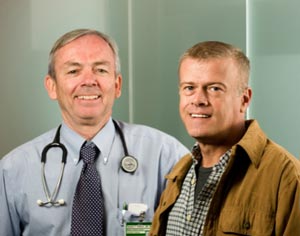
Loren Antes, 41, was dying to stay alive – literally.
Diagnosed with HIV/AIDS in 1987, Antes was subjected to a pharmaceutical regime that just about killed him. Each day he faced a decision of whether to ingest the 24 pills that were designed to keep the virus that causes AIDS at bay or to just let the disease take over his body and be done.
He took the pills, and because he did, the dramatic advances in the treatment for disease in the last few years saved his life. Even more exceptional, he found Stephen Raffanti, M.D., MPH, founder of the Comprehensive Care Center (CCC) in Nashville.
Ante was the first patient seen at the CCC when it opened in 1994. The independent, non-profit HIV/AIDS treatment organization is now one of the largest and most successful facilities in the nation.
It recently moved its clinical services to Vanderbilt Health One Hundred Oaks. Patient care will be provided by the Vanderbilt Medical Group under a new name – the Vanderbilt Comprehensive Care Clinic.

And, as fitting since he was CCC’s first patient in 1994, Antes was also the first patient seen at the new location when it opened its doors on Oct. 4.
“It is amazing how things have changed since I was first diagnosed to today,” he said. “I remember when I was first told I was HIV positive. I saw it as a death sentence. It was a death sentence back then. And now everything’s changed—now you can live with it and survive it.”
Antes credits the CCC with his survival.
“This center has kept me alive,” he said softly. “There were times . . . there were times I wasn’t so sure about what was coming next. It was tough back then. When I first started the treatment, I thought, ‘This ain’t working.’
“The medicines were making me sick. The side effects were awful,” he said. “There were days that it was a really hard decision. Should I take the pills that were making me so, so sick to try and survive this disease or just forget it and let the disease take over?”
“I seriously considered giving up,” he said. “There were times I couldn’t take the medicines. There were times I wouldn’t take the medicines.”
Antes lived long enough to have genotyping performed. Genotyping identifies the drug resistance characteristics of the HIV strain infecting a particular individual. The test informs doctors which drugs are unlikely to be effective in reducing the viral load of the patient.
Instead of the standard cocktail of medications, doctors were able to prescribe specific drugs that worked best for Antes’ illness.
“The medications that he was on initially were the only ones available for his form of the virus,” said Raffanti, associate professor of Medicine at Vanderbilt University Medical Center. “As time lapsed, newer meds emerged and the knowledge of which controlled certain viruses. And these were much easier to take and this made treatments so much better because of fewer side effects.
“The therapies are like night and day,” said Raffanti. “There were so many patients who just couldn’t tolerate the medications. They just couldn’t do it. Loren is one of the lucky ones.”
Today Antes is much healthier than he was when he first visited the CCC 16 years ago, said Raffanti, who applauds Nashville’s willingness, two decades ago, to accept the challenge of treating patients with HIV/AIDS.
Nearly 7,500 patients have been treated through the CCC since it was formed as a collaborative effort between local hospitals, businesses and Vanderbilt. With 1,200 patient visits a month, the clinic provides care for more than 2,800 patients at the One Hundreds Oaks site as well as satellite clinics in Cookeville, Columbia and Springfield.
About 400 new patients are enrolled each year at the CCC.
“We have some of the best health outcomes for people with HIV in the world,” said Raffanti. “We are nationally and internationally recognized as a clinical leader. As long as we cannot cure HIV, the next best thing is to treat it effectively so people can live out their lives. That is what we are doing now. Most of our patients will be productive members of society.”
The CCC partners with various local organizations to maximize the services offered to patients and the recent association with Vanderbilt will only boost the resources available to health care providers, patients and the community, Raffanti said.
The 24,000-square-foot facility is located on three floors that comprise clinical, research and educational efforts allowing patients to benefit from the latest advances in medical care, technology and informatics.
The CCC will continue to be a critical site for training health care professionals in HIV/AIDS care in conjunction with the Tennessee AIDS Education and Training Center as well as conducting clinical research with the Vanderbilt-Meharry Center for AIDS Research and the Vanderbilt AIDS Clinical Trials Program, all of which are moving their operations to the new site.